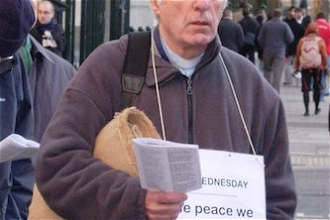Iraq: crisis looms as water supplies break down
Engineers working with Christian Aid and its partner organisations warn that people in Iraq will start to fall seriously ill soon as water supplies in many areas have been cut off. Children under five, the elderly, the sick and malnourished are most vulnerable. Daytime temperatures are now typically soaring to over 100 F. If clean water is not there, people will drink whatever they can. In Basra, where there are virtually no safe alternatives to the public water supply for the poorest people, the situation is particularly serious. In Baghdad, many people and communities have been digging wells as a safeguard against a failure of the system. Churches and mosques have sunk 50 wells to supply their local areas, in a scheme part-funded by Christian Aid. But in Basra, this is not an option - the geology of the area means that the ground water, from which wells would draw supplies, is too saline to drink. The same goes for the Tigris and Euphrates rivers that converge in the marshes north of the city. Normal water treatment plants, such as the failed plant of Wafa al-Qaed, cannot remove the salt to make this river water useable. The supply of 'raw' fresh water for Basra actually comes from the Baghdad area, transported in a channel which diverts water from the Tigris before it becomes too salty. But on its 800 km journey south in the open channel, this becomes heavily polluted - from agricultural waste, chemicals and raw sewage from towns along the way. This is the water that the Wafa al-Qaed plant normally treats. It must then be pumped into elevated storage tanks, before it can be fed into the city's water distribution pipes. If power has also failed on these pumps, the taps will remain dry even if clean water can be restored. But it is not just drinking water that is needed. International standards state that an individual needs a minimum of 15 litres per person per day for personal hygiene as well as drinking. Without it people cannot wash their hands, food or clothes, again contributing to the rapid outbreak of epidemics. The most important of these are diseases such as dysentery and cholera, which has broken out before in Basra when the city went without clean water. The fact that the city's sewage system is close to collapse, after more than 10 years without proper maintenance, can once again only make the situation worse. "Unless something can be done very, very quickly, it will be a humanitarian disaster," said Tor Valla, chief water engineer of Norwegian Church Aid, working with Christian Aid. "People will become weaker and weaker as they are unable to keep food in their stomachs. Then they will die." The charity may fly six mobile units to Kuwait, with the hope that they can be rapidly deployed to Basra next week while repairs are carried out on the failed plant. Valla will be part of a five-man team, operating under the UN banner. "I can only hope that our worst scenario will not be a reality," he said.


















